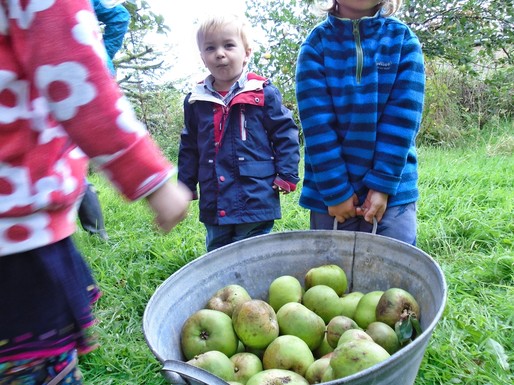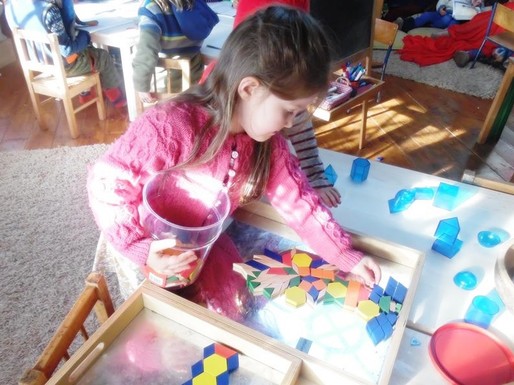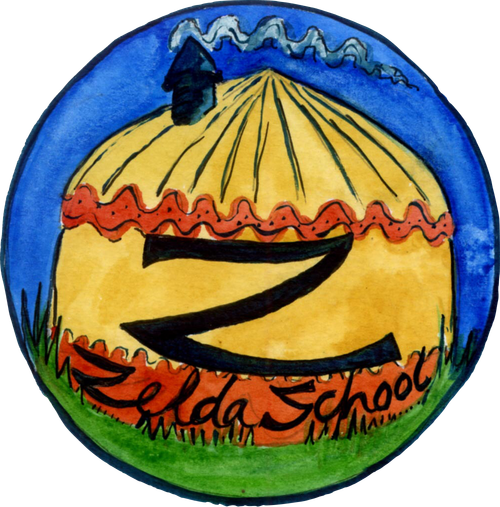The Kindergarten day begins outside, perhaps helping in the garden, building with logs, driving a bus made from upturned furniture or digging in the sand. Teachers and assistants are usually engaged in a task such as preparing bread dough or snack, and children are free to help with these jobs if they so wish. Particular jobs are done on certain days, Monday - gardening, Tuesday - preparing snack, Wednesday - cleaning out the animals, Thursday - baking and Friday - cleaning or washing toys.
A welcome song is then sung to bring the group together to start the day, and the children go in for circle time, followed by snack time. The activities in circle time help to focus the children’s attention - singing songs, playing group games and speaking and acting rhythmical verses. Listening and clear articulation is practiced and the children will develop a rich and meaningful repertoire of songs, stories and poems.
The day is structured with varied pace, moving between periods of expansion and contraction to balance times of activity and of rest. In practice, this means that creative play is followed by a more concentrated ring time, or outdoor activity by a quiet story. The latter is a comparatively short period in the Lower Kindergarten and is extended for Upper Kindergarten.

At 12 o’clock a tidy up song is sung and the children gather in Upper Kindergarten for yoga.
Lunch is served at 12.30pm, and is started with a blessing on the meal before eating. Meal times at Zelda School are social and civilised, with children and adults sharing many interesting conversations. The children may be asked help to clear up at the end of the meal.
Lunch is followed by a short playtime and then a rest time in the Lower Kindergarten at 1.15pm. Children and adults collect their blankets and lie down quietly, and some children may fall asleep. Rest time is followed by another activity time.

During the afternoon the children may make things for particular festivals such as decorations, mobiles, lanterns etc., either to decorate the classroom or take home. The children are welcome but not required to ‘help’ with any activity and they are only expected to engage in the activity as long as their interest lasts.
Towards the end of the day the teacher and assistants begin the tidy-up song to initiate clearing things away, and children join in helping each tool or object to find its place – sorting, matching, folding and stacking. Tidying up is an important task and it is done in such a way that it does not occur to the children that it is something that spoils their fun or is a tedious chore. It is done out of imitation of the adults and soon becomes part of the rhythm of the kindergarten day.
Story time is always a very special moment in the day. The mood is hushed and the expectation is that children will listen and respect that this is a quiet time. The children are told many wonderful stories that belong to the literary heritage of childhood. Fairy tales and nature stories address the feeling realm and awaken a moral sense. A well-told story creates appreciation for the human voice, extends vocabulary and aids the development of good memory and imagination. Children love to hear the same story many times and delight in repetition, deepening their relationship with the story until they are satisfied they have extracted everything they need from it.
The kindergarten day follows this consistent and predictable pattern. The children do the same things at the same times, carried through imitation of others. Within the rhythm the children feel held and secure and rarely express a wish to be excused from an activity or event.
In Upper Kindergarten, the morning is a working time with adult-led learning or instruction followed by self-initiated learning. Children are given broad topics, which they may research and expand upon themselves, taking the learning in the direction that interests them. Some or all children may take their learning outside, then towards the end of the session they come back together and share what they have discovered. In the afternoon, the Upper Kindergarten have the opportunity to develop their art and craft skills, learn languages, gardening, cooking, musical instruments, practise reading or take part in smaller group work. They will also be busy making things for particular festivals to decorate the classrooms.
